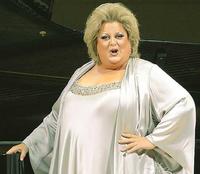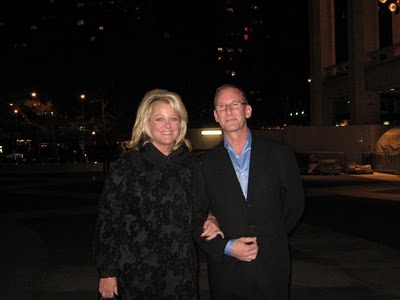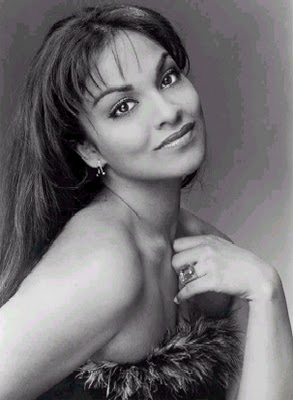Did the fat lady sing?

To this day, people who have seen Voigt thin and not almost cannot help but comment on how her voice sounds now as compared to then. Regardless, Ms. Voigt is still one of the world's leading sopranos and she continues to thrill audiences around the world. She's happy, she's working, and she's a svelte beauty with enormous talent. However, she has probably changed how people perceive opera singers for at least a generation in ways that would have been unthinkable a few years ago. Deborah Voigt killed the fat lady. In all but a few roles, it's over for them as far as opera is concerned.
 Patrick and I discussed this over lunch the other day and he pointed out that people in general are in better shape than they used to be, so the slimming down of opera singers may be more of a natural evolution paralleling changes within the culture at large. That's a keen observation though I'm not convinced that's the entire story. I watched "The Audition" the other night on PBS, a documentary about eleven young singers competing for the Met's National Council Auditions in 2007. There's a moment in the film where the judges are discussing the future prospects of the singers and one of them weighs in on the size of one of the females, implying her size will be an impediment to her career. Of the the five women competing, two were slender and three were not. Interestingly, the winners ended up being the larger women but none of the female contestants has set the world aflame yet.
Patrick and I discussed this over lunch the other day and he pointed out that people in general are in better shape than they used to be, so the slimming down of opera singers may be more of a natural evolution paralleling changes within the culture at large. That's a keen observation though I'm not convinced that's the entire story. I watched "The Audition" the other night on PBS, a documentary about eleven young singers competing for the Met's National Council Auditions in 2007. There's a moment in the film where the judges are discussing the future prospects of the singers and one of them weighs in on the size of one of the females, implying her size will be an impediment to her career. Of the the five women competing, two were slender and three were not. Interestingly, the winners ended up being the larger women but none of the female contestants has set the world aflame yet.
The most popular singers (including men at this point) are largely people who are increasingly very good-looking by standards that could not be considered operatic. Anna Netrebko, Renee Fleming, Angela Gheorgiu, Nathan Gunn, Juan Doego Florez and Rolando Villazon are all slim people, good-looking people. Well, Rolando actually looks like a Latin Mr. Bean, but he's skinny. So what you say. Why am I prattling on about this? Well, when I started to consider the female stars for San Francisco Opera's upcoming season I realized that it was full of young, gorgeous women in the lead roles. Sure, the locals who know her talent can't wait for Heidi Melton to sing Sieglinde in the 2011 Ring cycle, but for the most part when you put a heavy women onstage nowadays, unless it's Christine Brewer or Stephanie Blythe in certain roles (i.e. German opera or as a malevolent supporting character), the audience is increasingly going to say "What? Really? Why couldn't they get ______ for the part- she looks so much better."
Maybe we aren't there yet, but seriously- it is just around the corner. The Royal Opera's gaffe has turned into a standard casting practice across the world, validated by the Met's Peter Gelb and quietly being implemented in places like San Francisco and Los Angeles. For me, I think this is a positive trend, and I really don't think a women needs to be Jane Eaglen's size to fill the house with sound. After all, Mimis, Carmens and Violettas are much more convincing when they don't look like the well-fed wives of the King. Opera fans of the "voice is everything" school will view such thoughts as anathema and ridiculous, but I've never understood why those people don't just attend lieder concerts and shut up about opera. Opera is a combination of music and drama- it doesn't work without both and when the people onstage look and sound the part (and can act as well as sing) it is only then that the true power of the Western world's most potent art form fully comes to life.
Below are the sirens of the 2010 San Francisco Opera season. Six reasons to applaud Operavision in the balconies, or justification to buy really good seats. Either way, although the programming for next season is very conservative, in some ways the coming season never looked so good. A fluke? No way. Thanks Deborah- we owe more than we can possibly express and look forward to your first Minnie this summer. Photo below of John Marcher and Deborah Voigt, taken outside of the Met on a cool November night in 2009.

Here are the hotties:

Ainhoa Arteta, Roxane (Cyrano de Bergerac)

Karita Mattila, Emila Marty (The Makropoulos Case)
Photo of Mattila by Richard Avedon
Svetla Vassileva Cio Cio San, (Madama Butterfly)

Elina Garanca, Charlotte (Werther)
Danielle de Niese, Susanna (The Marriage of Figaro) I could easily skip Aida, but the rest? I want to see them as well as hear them.
I could easily skip Aida, but the rest? I want to see them as well as hear them.
